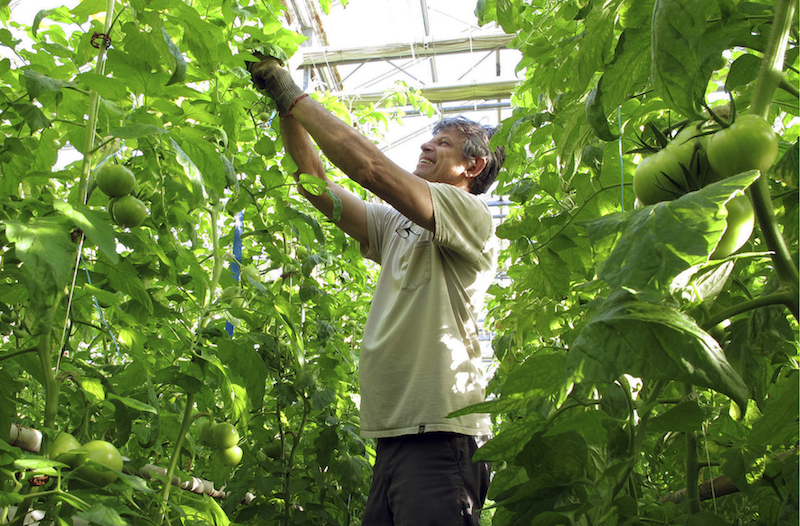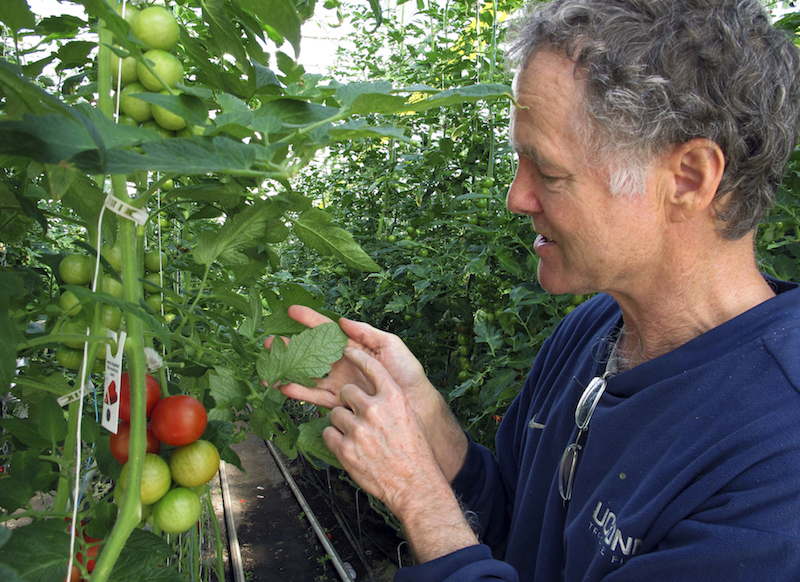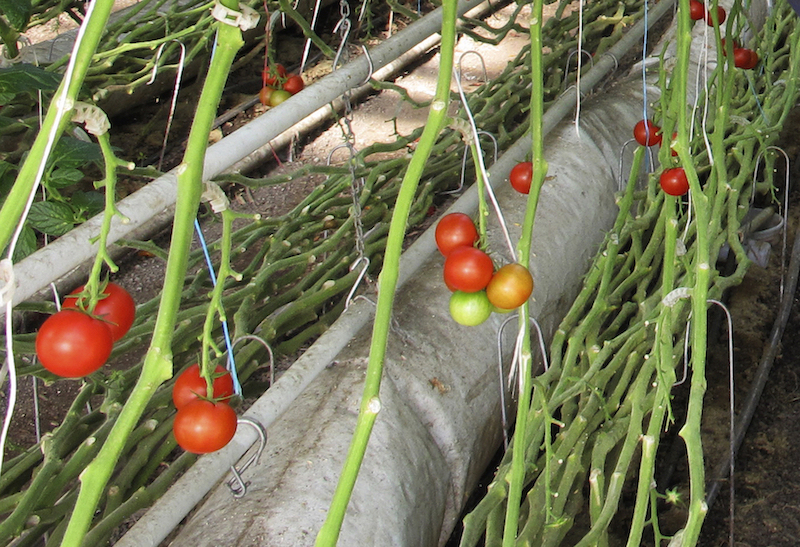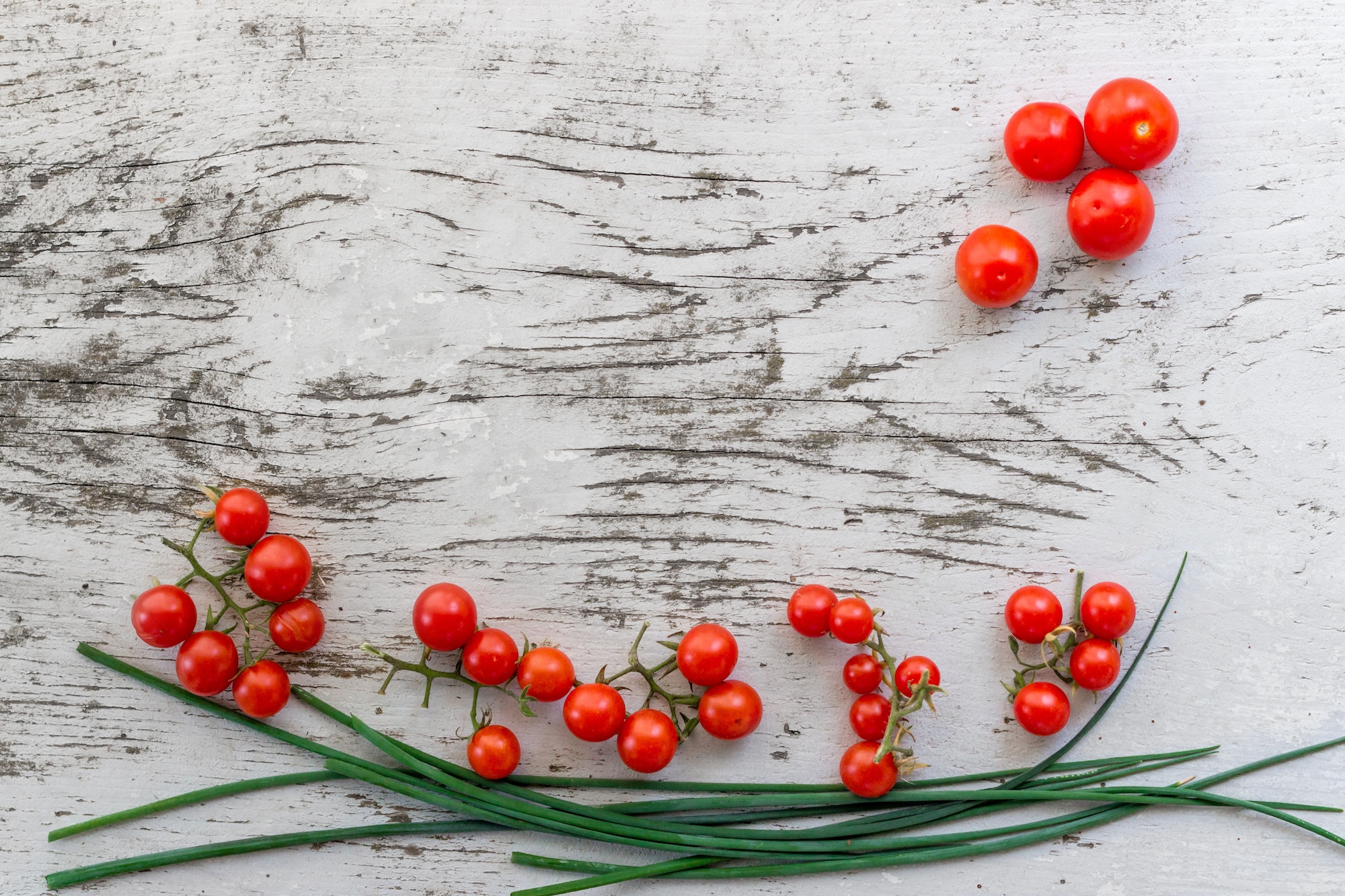あなたが買ったトマトがどこで育ったものかご存知だろうか。土、それとも水?
この夏、オーガニック食品にこだわる買い物客に答えを教えてくれる新たなオーガニック食品認証ラベルが誕生する。さらに、消費者の選んだ商品が、今の制度に反対する農家や科学者グループが認める「オーガニック活動の真の精神」と合致するかどうかも知ることができる。
先月末、アメリカ各地から15名の農家および科学者がバーモント州に集い、新たな有機認証プログラムの基準を作成した。今年夏には本プログラムを米国内の20から60軒の農家に試験展開する予定だ。

AP Photo / Lisa Rathke
現行の農務省プログラムでは、トマト栽培時に合成物質(例外を除き)や遺伝子組み換えといった特定の手法を使用しなければ、オーガニック認証ラベルの対象となる。しかし今回誕生する新ラベル(名称や呼称は未定)の認定を受けるには、たとえばトマトならきちんと土壌で栽培されることが求められ、食肉や乳製品なら家畜を放牧する農家が生産した商品でなければならない。
農家がきちんと新基準を順守しているか否かを検査官が認定し、流通業者ではなく農家自身がラベルを付加する。
今回の運動が始まったのは、アメリカ農務省の顧問機関である国立有機標準委員会(USDA)が有機認証プログラムからハイドロポニック(植物を土ではなく水だけで育てる方式)とアクアポニック(植物と魚などの水生生物を1つのシステム内で育成する方式)を除外する、という提案を却下してから5カ月後のことだ。
コロラド州デュランゴの野菜栽培農家、リンリー・ディクソン氏は、「多くの農家、特に若い農家は、今やオーガニック認定では栽培方法を示すことができないと感じている。我々は、それを奪還するために尽力している」と話す。ディクソン氏は有機栽培研究機関のコーニュコピア研究所で上級科学者を務め、またリアル・オーガニックプロジェクトの基準委員会にも産している。
新たに認証ラベルを作成するグループ「リアル・オーガニックプロジェクト」は、連邦基準である「ナショナル・オーガニックプログラム」の放棄や、有機農家に対する批判の意図はないと話している。

リアル・オーガニックプロジェクトの執行委員会および標準委員会のメンバーで、セットフォードでトマトの有機農場を営むデイブ・チャップマン氏は、「有機農法の礎石がいくつも排除されてしまった。その結果、すべてが時代から取り残されてしまうのでは、と懸念している」と話す。彼は、土壌で栽培すること、そしてその肥沃度を向上させることが有機農法の礎石であると確信している。
ディクソン氏にとって「オーガニック」とは、動物や作物を循環させること、また土壌の浸食抑制や有機物繁殖、また雑草管理のために被覆作物を植える、といった非常に多様な作業を意味する。
今回の新認証ラベルでは、ハイドロポニック農法および動物を放牧していない大規模畜産経営(CAFO)として知られる大手の畜産農場は認められない。ハイドロポニック業界は、新たなラベルは消費者をミスリードし、混乱させるもので、伝統的な有機農家が競争力を得るための手段だと主張している。「土壌栽培にとって生産量が上回るハイドロポニックは競合だ」とハイドロポニック・ソサエティ・オブ・アメリカの代表を務めるダン・ルブケマン氏はいう。

モンペリエのハンガー・マウンテン食品協同組合で買い物をするウスターのジェシカ・マンチェスター氏は、確かに一般的な消費者はラベル表示で混乱していると話す。しかし、長期的には食品の出自を知るのは良いことだという。彼女自身は土壌で栽培された生産物のほうがいいと述べた。
「私はただ、植物は自然な方法で育つ方が良いと考えている。土壌中の微生物とかかわり、そして微生物と植物の根が相互作用するのが自然な形だ」とマンチェスター氏は述べた。
しかし、同じく買い物客のローリー・グリッグス氏(カレー在住)は、オーガニックでない製品も購入し、また野菜や果実がハイドロポニックで育ったものかどうか、特に気にしていないと話す。
「私はただ、新しい作物栽培方法が必要だと考える」とローリー氏はいう。さらに「人間の数は非常に多く、農業は土地を酷使している。もし、土地への影響を軽減し、かつ人々にとって健康的な食品を育てる方法を見つけることができたら、万事うまくいく」と語った。
関係する農家らはさらに透明性の高い認証ラベルを求めており、当初は経済的な利益を見込んでいないとチャップマン氏は語る。同プログラムの資金は、今のところ寄付に頼っている。認定を受ける農家からは手数料を受け取るが、プログラムのコストはカバーできないのではないか、と彼は考える。
「アメリカ国内には、食品が土壌で育ったのか、あるいは動物が牧草地に出入りできるのか、を気にする人々が大勢いる。だからこそ、いつか経済的な利益を得られる日が来ることを願っている」と彼はいう。
By LISA RATHKE, Associated Press
Translated by isshi via Conyac
Was your tomato grown in dirt or water? Organic shoppers might notice additional labels this summer that will give them the answer — and tell them whether their choices align with what a rebellious group of farmers and scientists deem the true spirit of the organic movement.
About 15 farmers and scientists from around the country met in Vermont late last month to create the standards for an additional organic certification program, which they plan to roll out nationally to between 20 to 60 farms as a pilot this summer.
Under the current U.S. Department of Agriculture program, the organic label means that your tomato has been produced without synthetic substances — with some exceptions — and without certain methods, like genetic engineering. The additional label, which does not yet have a name or wording, would indicate that a tomato, for example, has been grown in soil, and that meat and dairy products came from farms that pasture their animals.
An inspector would certify that the farm has complied with the new standards, and the farms — not distributors — would add the label.
The move comes five months after the National Organic Standard Board, which advises the U.S. Department of Agriculture, voted against a proposal to exclude from the USDA’s organic certification program hydroponics — raising plants with water but no soil — and aquaponics, in which plants and aquatic animals, such as fish, are grown within one system.
“I think that a lot of farmers, especially young farmers, feel that the organic label no longer describes the way they farm, and we’re trying to recapture that,” said Linley Dixon, a vegetable farmer in Durango, Colorado, and senior scientist for Cornucopia Institute, who is also on the standards board of the Real Organic Project.
The group creating the new label, which calls itself the Real Organic Project, said it has not abandoned the National Organic Program, which is the federal standard, and is not attacking organic farmers.
“Some of the cornerstones of what organic means are being taken away, and we’re concerned about how creaky that makes the whole thing,” said Dave Chapman, a member of the executive and standards board of the Real Organic Project and owner of an organic tomato farm in Thetford. He believes the cornerstone of being organic is growing in soil and improving its fertility.
To Dixon, “organic” means a very diversified operation, rotating animals and crops and planting cover crops to control erosion, increase organic matter in the soil and manage weeds, among other things.
The new label would exclude from certification hydroponic farming and large livestock farms that don’t pasture their animals, known as contained animal feeding operations or CAFOs.
The hydroponic industry argues another label would mislead and confuse consumers and is a way for the traditional organic farmers to try to get a competitive edge.
“It’s a competition because field farmers can’t produce the volume that hydroponics can,” said Dan Lubkeman, president of the Hydroponic Society of America.
While shopping at Hunger Mountain food cooperative in Montpelier, Jessica Manchester, of Worcester, agreed labeling is getting confusing for the average consumer but in the long run thinks it’s good to know where food comes from. She said she prefers produce grown in soil.
“I’m just in favor of plants growing in their natural way and being in connection with the microbes in the soil and the interactions those microbes have with the plant roots,” Manchester said.
But fellow shopper Laurie Griggs, of Calais, said she doesn’t buy totally organic and doesn’t mind if vegetables or berries are raised hydroponically.
“I just think we need new ways to grow things,” she said. “We’ve got a lot of people and farming’s really hard on the land, and if we can find ways to lighten our impact on the land and grow healthy food for people, I have no problem with it.”
The farmers involved want a more transparent label and will not see an economic benefit at first, Chapman said. The program is now being funded by contributions. Farmers would pay a fee to be certified, but he doubts that would cover the cost of the program.
“I hope the day will come where there will be an economic benefit because I know that there are millions of people in the country who actually do care about whether food is grown in the soil and whether the animals have access to the pasture,” he said.
By LISA RATHKE, Associated Press
THETFORD, Vt. (AP)



